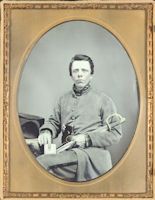Jackson, Tenn., June 26, 1863.
Such splendid weather—nice, fresh breezes ruffling the leaves on the trees all the day long—and plenty of rain to keep the dust in order. I was up early this morning and the mocking birds were playing a reveille, from whose sweetness bees might make honey. There are hundreds of these birds living in a grove near our headquarters, and I can’t find time and ease enough to enjoy their concerts as I want to.
A flag of truce came to our lines yesterday on the Holly Springs road. The general sent me out to receive it. A lieutenant and eight men, all rough, dirty fellows, made the party. They were not very communicative. They brought a small mail and a trifling communication about prisoners. They belonged to Colonel Morton’s 2d Tennessee (Rebel) Cavalry, and were sent by General Ruggles. The general has promised to let me take a flag to Okolona. Don’t know when I shall go. I do think that General Oglesby is the very ideal of a chivalric, honorable, gallant, modest, high-spirited, dignified, practical, common-sense, gentleman. Nobody can help loving him. He hates a particle of meanness as much as he does a bushel. If we were only doing something more active I should be perfectly happy. As it is, I think seriously of asking to be sent back to my regiment. The general will not be able for any more field work, and I hardly think it right manly in me to stay back here with a railroad guard, when there is so much to be done in front, and I am so strong and able to bear the field duty. You should hear the general talk. There is such a big rolling river of fun and humor in his conversation. Such a hearty honest laugh; I know his heart is big enough to hold a regiment. I believe he thinks as much of the old 8th as of his family. When he has been speaking of the gallant conduct of the 8th at Donaldson and Shiloh, I have seen his face flush up and it seemed as though his heart jumped up to his throat. I was over to the negro camps yesterday and have seen a good deal of them since I last wrote you. An honest confession is good for the soul. I never thought I would, but I am getting strongly in favor of arming them, and am becoming so blind that I can’t see why they will not make soldiers. How queer. A year ago last January I didn’t like to hear anything of emancipation. Last fall accepted confiscation of Rebel’s negroes quietly. In January took to emancipation readily, and now believe in arming the negroes. The only objection I have to it is a matter of pride. I almost begin to think of applying for a position in a regiment myself. What would you think of it? We had quite an alarm two or three nights since. Nobody hurt, but some Tennesseans badly scared. I guess I will go to Memphis to-morrow to look for a spy who has been along our line, and whom we think is now in Memphis. Well, I must go and see the provost marshal about disposing of some prisoners. First, I’ll tell you what three soldiers did the night we had the alarm here. Colonel Mizner, with 1,000 of our cavalry, had been on a scout nine days, and that night we heard that he was within 15 miles of here on his return. We heard of the enemy about 1 a.m. and immediately sent these three men (volunteers for the purpose) to notify Colonel Mizner and have him march all night. They reached the little town, Mt. Pleasant, without incident on the way. There was a lot of guerrillas camped in town that night, and their guard hailed the boys and fired. Our men, only three, charged with a yell and scared the whole party out of town. They couldn’t find the colonel and started to return. When two miles on the way back, at a turn in the road, they met Mitchell’s Rebel company (60 men). Our boys yelled, “here they are, come on boys,” and charged, firing their revolvers. They brought one man down, and made the next fall back some 200 yards where they commenced forming line. Our fellows then took to the woods, got around them and back to camp at 6:30 a.m.







